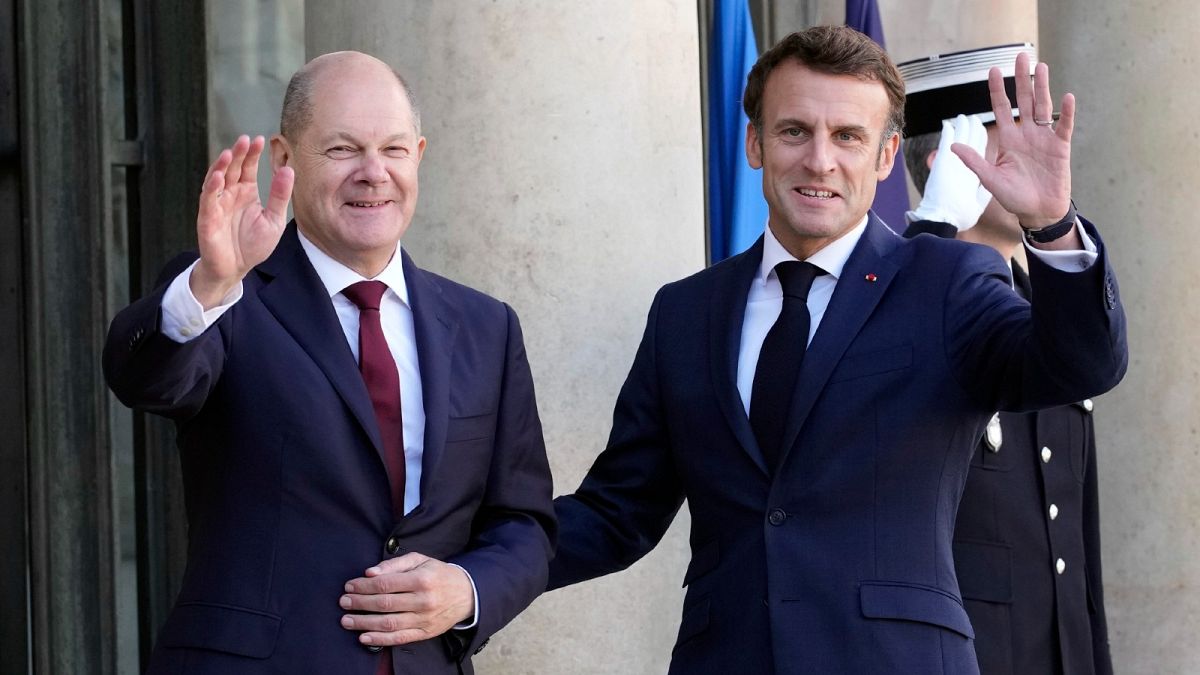Both countries have bones to pick with the other on issues ranging from energy to defence.
Olaf Scholz on Wednesday played down rumours that the Franco-German engine is spluttering following a meeting with Emmanuel Macron.
The working lunch between the German chancellor and French president was in lieu of a cancelled ministerial meeting, initially scheduled for this week but now postponed to January.
The meeting typically is held annually but hasn't taken place in person since the COVID-19 pandemic.
Officially, the reason for the postponement of the meeting is that several German ministers are unavailable due to school holidays.
But difficulties in finding common grounds on a host of topics including how to best tackle skyrocketing energy prices as well as defence loom large.
The two leaders did not appear in front of the press together following their meeting. Berlin initially said the two leaders would face reporters together after their meeting only for Paris to refute it later.
Instead, Scholz took to Twitter where he assured that he had had "a very good and important conversation today" with his French counterpart on issues including energy supply and joint armament projects.
"Germany and France are standing closely together and tackling the challenges together," he insisted.
Both Macron and Scholz had already sought to downplay their differences as EU leaders gathered in Brussels last week for a summit to discuss ways to curb energy prices.
"We don't always have the same positions, which is normal, and we are at a key moment when many things are being revisited in our Europe on energy, defence and the economy," Macron told reporters on Thursday.
"All this requires hard work. But as I have always said to you, I think that European unity is key in this period and that is what we are working on," he added.
Scholz’s spokesman, Steffen Hebestreit, meanwhile said that "there are a whole series of different topics that are currently occupying us. I don’t know whether there are snags but it’s not yet the case that we’ve reached a united stance."
Energy, defence and China
On energy, both countries agree with proposals from the European Commission for joint purchases of gas and for the creation of a new benchmark that would take LNG imports into account and should therefore result in lowered prices.
But Germany is against the proposed roll-out of an EU-wide price cap on gas or the extension of the so-called Iberian model — which caps the price of gas used for electricity generation — to the rest of the bloc. It argues that the measures, which Paris supports, could respectively lead to supply issues or an increase in consumption.
The Elysee is also reportedly not pleased that Germany failed to consult them before unveiling a €200 billion aid package to make sure its citizens and businesses can survive this period of high energy prices on the grounds it could distort competition within the Single Market.
The Chancellery, meanwhile, is smarting from the French decision to block the construction of a pipeline through its territory that would have seen Germany receive gas and then hydrogen from Spain.
Paris argued that the project went against European transition goals and instead agreed last week with Madrid and Lisbon to build an underwater pipeline between Barcelona and Marseille that would primarily transport hydrogen.
On defence, a traditionally strong French issue, there are also divergences. Russia's war in Ukraine has precipitated a security rethink in Berlin with a €100 billion plan to shore up its capabilities. It has also shepherded the creation of a European Sky Shield Initiative to plug caps in the bloc's air defence system.
The problem for Paris, which is championing EU sovereignty, is that both initiatives would see Berlin investing heavily in US-manufactured weapons systems, rather than European equivalent.
EU sovereignty is also at the heart of their differences when it comes to China, which Scholz is scheduled to visit next week with a delegation of German business leaders, despite calls for the EU to wean itself off its trade dependence on Beijing.
Berlin's seeming do-it-alone attitude is grating Paris, which had invited Angela Merkel and Jean-Claude Juncker, then German Chancellor and Commission chief, when Xi visited Paris in 2019.
